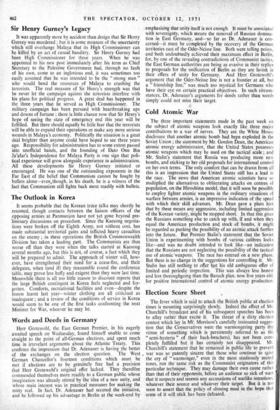Words and Deeds in Germany
Herr Grotewohl, the East German Premier, in his eagerly awaited speech on Wednesday, found himself unable to come straight to the point of all-German elections, add spent much time in irrevelant arguments about the Atlantic Treaty. This- confirms the impression that Dr. Adenauer is having the better of the exchanges on the election question. The West German Chancellor's fourteen conditions which must be met if elections are to be genuinely free had a precision that Herr Grotewohl's original offer lacked. They therefore commended themselves more readily to a German public whose imagination was already stirred by the idea of a new unity, and whose main interest was in practical measures for making the unity real. In fact, Dr. Adenauer had secured the initiative, and he followed up his advantage in Berlin at the week-end by emphasising that unity itself is not enough. It must be associated with sovereignty, which means the removal of Russian domina- tion in East Germany, and—so far as Dr. Adenauer is con- cerned—it must be completed by the recovery of the German territories east of the Oder-Neisse line. Both were telling points, and-both undoubtedly achieved their maximum effect in Berlin, for, by one of the revealing contradictions of Communist tactics, the East German authorities are being as evasive in their replies to proposals for the unification of Berlin as they are lavish in their offers of unity for Germany. And Herr Grotewohl's argument that the Oder-Neisse line is not a frontier at all, but a " friendship line," was much too mystical for Germans who have their eye on certain practical objectives. In such circum- stances, Dr. Adenauer's arguments for deeds rather than words simply-could not miss their target.


































 Previous page
Previous page